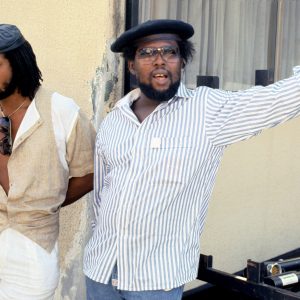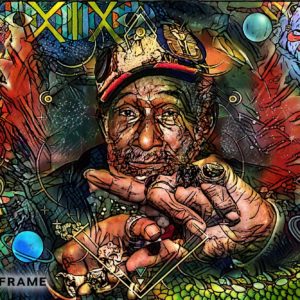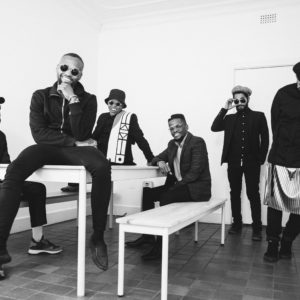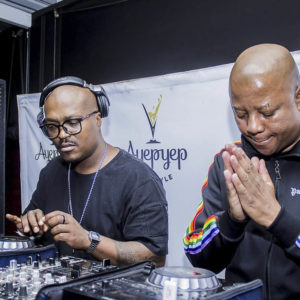Goodbye to a rhythm king
The death of Robbie Shakespeare brings an end to Sly & Robbie, one of the greatest musical partnerships of all time.
Author:
17 December 2021

When the first day of 2021 delivered a new Sly & Robbie album, nobody could have known it would be the duo’s last. Eleven months later, on 8 December, legendary bassist Robert Warren Dale Shakespeare died in Florida in the United States at the age of 68, reportedly while recuperating after kidney surgery.
Fittingly, their last album Red Hills Road paid tribute to the mid-1970s origins of the “rhythm kings”. The duo famously met on Red Hills Road in the city of Kingston and St Andrew, Jamaica, which was home to a host of popular nightclubs. Sly Dunbar, the drummer for local band Tit for Tat, popped over to the Evil People nightclub to catch The Aggrovators, a band featuring bassist Robbie Shakespeare, and the rest is history.
Jamaica’s culture minister, Olivia Grange, hailed the duo as being among the island’s greatest musicians. “This fantastic team took bass playing and drumming to the highest level as they made music for themselves as a group, and for many other artistes locally and internationally,” she said on 8 December.
Related article:
Decades of great albums as a duo – Sly & Robbie Present Taxi (1981), Rhythm Killers (1987), Drum & Bass Strip To the Bone By Howie B (1998), The Dub Revolutionaries (2004) and Dubrising (2014) – are only part of the story. Sly & Robbie were the production brains behind Black Uhuru, the first reggae band to win a Grammy Award, and collaborated with stars such as dub legend King Tubby, reggae legends Peter Tosh, Dennis Brown and Gregory Isaacs, funk legends Bootsy Collins and Bernie Worrell, hip-hop stars KRS-One, Queen Latifah and the Fugees, rock stars Bob Dylan and the Rolling Stones, and pop stars Grace Jones, Gwen Guthrie and Madonna.
Shakespeare’s death has forced one of the greatest partnerships in music history into retirement.
Rising up in Jamaica
Shakespeare was born in East Kingston on 27 September 1953. His home was a musical one and he was drawn to the bass guitar at a young age.
“When I started to play bass, my hero was Family Man [Aston Barrett] of The Wailers,” Shakespeare told Kevin O’Brien Chang and Wayne Chen in their 1998 book Reggae Routes. “He was the first to play strong simple melodic lines with a deep feeling.” As Dunbar details in the book, his influences were Al Jackson Jr of Booker T and the MGs and Roger Hawkins, the drummer from the Muscle Shoals studio. “I especially like Al Jackson, because he kept it tight and simple,” said Dunbar.
Shakespeare was also drawn towards simplicity as he searched for his own style. “What I came up with was to play as simple and direct as I can, so that the people, the real audience, can relate to my sound,” he said. “Some other guy might say it’s too simple, but the best music, I think, is when it’s simple and not so difficult that [listeners] can’t understand.”
Over the next 50 years, the duo would revolutionise not only their chosen instruments but also the way the bass and drums are recorded and produced, whether they were recording roots reggae, dancehall or dub reggae. “From early sessions, me and Sly were already thinking about producing,” said Shakespeare. “I never liked the bass sound on older reggae records and Sly never liked the drum sounds.”
Related article:
In the late 1970s, the duo featured on classic albums such as Dennis Brown’s Visions of Dennis Brown (1978), Peter Tosh’s Bush Doctor (1978) and Gregory Isaacs’ Soon Forward (1979). They had also begun to work with Black Uhuru, a reggae band founded in 1972 by Derrick “Duckie” Simpson.
Things really started to take off for Black Uhuru in the early 1980s, when singer Michael Rose joined the band and Sly & Robbie took over on production.
Classic reggae albums like Sinsemilla (1980), Red (1981), Chill Out (1982), The Dub Factor (1983) and Anthem (1984) were the result, the last of which earned the band a Grammy Award, even if Red was clearly the masterpiece.
Sly & Robbie would win a second Grammy in 1998 for their album Friends, and receive two further nominations in 2014 and 2020.
The world comes calling
At the same time that Sly & Robbie were tasting early success with Black Uhuru, they were involved as the production crew with Compass Point Studios in Nassau in the Bahamas.
This resulted in the duo recording a trio of stellar albums with Jones – Warm Leatherette (1980), Nightclubbing (1981) and Living My Life (1982) – as well as two great albums with Guthrie, Gwen Guthrie (1982) and Portrait (1983).
The duo were facing growing demand as session musicians and as producers, and would go on to record on Joe Cocker’s album Sheffield Steel (1982), Dylan’s albums Infidels (1983) and Empire Burlesque (1985), the Rolling Stones’ album Undercover (1983) and Mick Jagger’s Bill Laswell-produced solo album She’s the Boss (1985), which also featured Pete Townshend, Herbie Hancock, Nile Rogers and Jeff Beck.
Related article:
Before producing She’s the Boss, Laswell had been involved in making two fascinating experimental albums with Hancock, Future Shock (1983) and Sound-System (1984). The Laswell connection is notable, because Sly & Robbie’s Laswell-produced Rhythm Killers From 1987 is arguably the duo’s finest album. It features Collins and Worrell, former members of George Clinton’s seminal funk bands Parliament and Funkadelic.
The band’s follow-up, 1989’s Silent Assassin, was produced by early hip-hop star KRS-One and featured Queen Latifah. But for many children of the 1990s, their first exposure to Sly & Robbie came through the duo’s production work on Chaka Demus & Pliers’ 1993 album Tease Me, which spawned the monster global hits Murder She Wrote, Twist and Shout, Tease Me and She Don’t Let Nobody, as well as the classic song Bam Bam, not released as a single.
As Sly & Robbie reached the mid-1990s, almost 20 years into their careers as a duo, they were unstoppable.
Fifty years of a ‘good thing’
Talking about their musical partnership to O’Brien Chang and Chen in Reggae Routes, both Shakespeare and Dunbar stressed that they were stronger as a team than as individuals.
“Each of us could go out and do individual work, but it wouldn’t be the same,” said Shakespeare. “Teamwork is always the best in anything, you shouldn’t fly a plane alone without a co-pilot or navigator.”
Related article:
“A lot of duos never realise that they have a good thing going and break up. They never know what they had until they lose it,” said Dunbar. “You must understand when you have something and don’t try to abuse it. We show respect for one another. We know we have a good thing going.”
When Shakespeare began to simply and directly channel his bass sound for “the people”, the world stood up and paid attention. For 50 years alongside Dunbar, he delivered and made the world dance. Their legacy is sprawled across five decades of albums that are critically hailed and popularly loved. Now Shakespeare is gone and as fans around the world grieve, their thoughts will naturally turn to the Shakespeare family and Dunbar during this time of loss.




